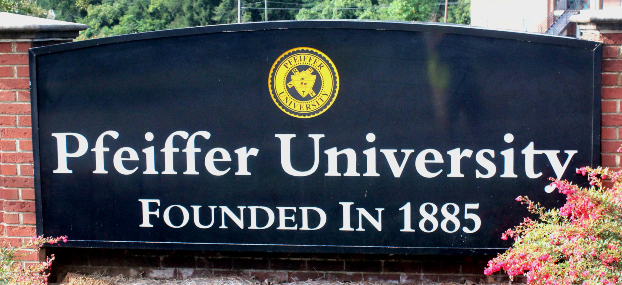Pfeiffer University names Grant Distinguished Alumni Award recipient
Published 10:26 am Tuesday, September 20, 2022

- Misenheimer, North Carolina
|
Getting your Trinity Audio player ready...
|
By Ken Keuffel
On Sept. 11, 2001, one of four planes hijacked by Islamic terrorists flew into the Pentagon. Heidi Honecker Grant (Class of 87), the recipient of Pfeiffer University’s 2022 Distinguished Alumni Award, was working there at the time, charged with overseeing the counter-terrorism budget for the U.S. Department of Defense (DOD).
The attack would profoundly shape her career for the next 20 years.
“Whenever I give talks on leadership, I always stress the importance of the ‘why’ in our lives — why we get up every day to do what we do,” she said. “I can trace my why to 9/11, which people around the world will never forget. On that day, I found my passion — to do what I could to prevent a similar tragedy from happening again.”
Following a 32-year stint at DOD, Grant joined The Boeing Company in November 2021 as its president of business development for defense, security, space and global services — leading an international team of nearly 500 people. Prior to that, she served in defense-related positions of leadership for several governmental agencies, and much of what she did was international in orientation.
“We were dealing with a global challenge,” she said. “I found that we needed to help other countries build up their military capability, because the United States couldn’t do it all. So, that’s kind of where my passion went.
“For over 20 years, I’ve been fortunate to play a role in creating partnerships with militaries around the world that have helped nations protect their people and their interests. We’ve shown the resolve of the United States and its allies to protect the world order and the individual rules of law.”
Grant’s career direction would also enable her to make history. In July 2020, she became the first civilian to lead the Defense Security Cooperation Agency, which has been described as the Pentagon’s lead agency on foreign weapons sales. The work entailed encouraging America’s partners and allies to buy its weapons, which meant working with the State Department to get the sales cleared with the appropriate government entities. She oversaw 1,500 cases of military sales with more than 150 countries; the business was valued at more than $600 billion.
“My role at the Defense Security Cooperation Agency was the pinnacle of what I could achieve as a public sector leader dedicated to making the world a safer place,” Grant said. “I was leading the whole Department of Defense in its efforts to build up the militaries around the world by getting them the equipment and training they needed.”
This opportunity was well aligned with Grant’s favorite George Washington quote, which has inspired her: “To be prepared for war is the most effective way to preserve the peace.”
Grant’s work before her agency appointment was no less impressive. Between 2002 and 2008, she served as the first civilian director of resources and analysis for U.S. military operations in the Middle East, Central and South Asia, and Northeast Africa.
This meant, among other things, that she led resource strategy and analysis for operations Iraqi Freedom and Enduring Freedom, working with senior military representatives from 65 countries.
Much of Grant’s career after the 9/11 attacks was in service to the U.S. Air Force. Beginning in 2010, she served for eight years as its deputy secretary of international affairs, helping to arrange sales of USAF equipment around the world.
Grant will receive Pfeiffer’s Distinguished Alumni Award on Oct. 1 as a part of Pfeiffer’s Homecoming festivities.
She grew up near Washington, D.C., the youngest of three siblings in her family to attend Pfeiffer College. Her siblings are Kathy Honecker Uffelman (Class of 1984) and Mark Honecker (Class of 1985). Her husband, Greg Grant, graduated from Pfeiffer in 1984.
Grant has always gravitated toward roles and opportunities that enabled her to “serve the greater good.”
At Pfeiffer, where she majored in business, she became active in student government, serving as both class president and as a leader on the College Union Board (now the Campus Activities Board), which booked guest entertainers. She also made numerous friendships, and she embraced a culture that encouraged her to lift up everyone, regardless of their faith or socioeconomic backgrounds.
“Pfeiffer planted the seeds for the person I’ve become,” she said.
After Pfeiffer, Grant became a student of leadership and has tried to pass on what she’s learned.
When asked what younger women might do to follow in her footsteps, she urges them to find their passion or why, to build up a diverse network and to keep learning. She advises them to stay true to their values. She highlighted her PARTNER values (Proactive, Accountable, Respectful, Transparent, Networked, Empowered, Representative).
While working in Iraq, Grant said she also learned the importance of pushing yourself outside of your comfort zone — another quality she urges aspiring leaders to adopt. In her personal example, Grant was given a military-looking uniform that enabled her to blend in with the troops, and she was issued a gun and taught how to use it for self-defense purposes.
“Because I was willing to do that, I was able to get into the war zone and ask the military what they needed,” she said. “One simple example illustrates the many valuable insights I gained: They said, ‘Well, we could really use some money to harden these dirt roads with asphalt to make it harder for the enemy to plant these bombs.’ ”
Grant returned to Washington, where she persuaded Congress to allocate funding for paving the roads, drawing on the credibility she gained from being onsite in Iraq and Afghanistan.
“There’s no way I would have been successful if I hadn’t left my comfort zone,” she said. “That was a real turning point in my development as a leader.”




